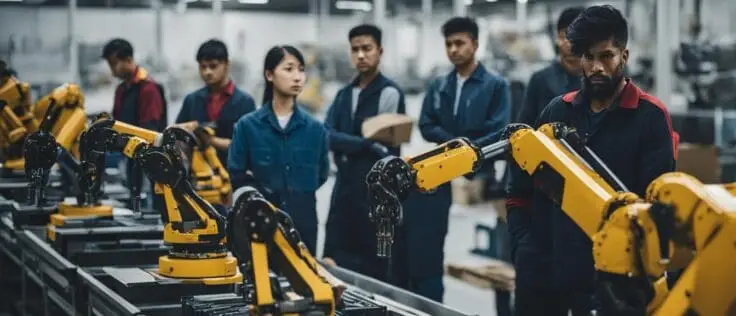As artificial intelligence continues to make its presence felt across a diverse array of sectors, including the rise of Chatbot GPT, the question arises: should workers replaced by AI get compensation? The growing concern surrounding AI and worker displacement highlights the pressing need to address the complex ethical, economic, and policy implications associated with this matter. This article aims to provide an in-depth exploration of the ongoing debate on compensation for AI replacing workers, while examining possible consequences and solutions for those affected by technological unemployment.
Key Takeaways:
- The need for compensation for workers replaced by AI sparks intense debate amidst the rapid advancements in AI capabilities.
- Technological unemployment stemming from AI replacing workers presents a range of ethical, economic, and policy considerations.
- Emerging AI tools like ChatGPT could heighten concerns over job security and the future of work for many individuals.
- Addressing the rights of workers, corporate accountability, and the role of government and policy play into the larger discussion of compensating displaced workers.
- Exploring the potential benefits and challenges of compensating AI-displaced workers can help inform a more balanced and equitable response to the rise of AI in the workforce.
The Growing Presence of AI: An Overview of Technological Displacement
As artificial intelligence (AI) continues to advance, its role in the professional world has become more prominent. The emergence of innovative tools like ChatGPT has demonstrated the capacity of AI to perform diverse tasks across a variety of industries. Consequently, concerns are rising around the possibility of AI replacing workers and the subsequent effect this may have on both individual livelihoods and the larger workforce.
With the potential for technological unemployment comes a myriad of questions regarding the future of work and AI compensation. The sheer versatility of AI applications has fuelled these ongoing discussions and brought to light new concerns for workers displaced by technology.
The advent of AI tools like ChatGPT has highlighted the technology’s capacity to undertake a variety of tasks across different sectors, causing alarm over the prospect of AI replacing human roles in the workforce and leading to technological unemployment.
Some key areas where AI technology has made inroads include:
- Customer service via chatbots and virtual assistants
- Automated analysis and decision-making in finance
- Logistics and supply chain optimisation through machine learning
- Healthcare diagnosis and treatment through medical image analysis
The rapid adoption of AI in various sectors of the economy signals the need for conversations around technological unemployment and compensation as companies gravitate toward automation. As AI continues to transform the job market, it is essential for stakeholders in all fields to engage in productive dialogue, devising responsive strategies to mitigate the consequences of technological unemployment.
Moral Dimensions: Ethical Implications of AI Replacing Workers
The rapid evolution of artificial intelligence brings to the forefront a myriad of ethical concerns, particularly when it involves the displacement of workers. As advancements in AI continue to pose significant risks to human jobs, it becomes imperative to delve into the rights of workers within this new landscape.
The Rights of Workers in the Age of AI
In a time when AI can potentially replace numerous job positions, the workers’ rights become a pivotal topic for ethical discussions. How to balance between the adoption of AI technologies and preserving the rights of employees presents a delicate challenge to governments and organisations alike.
Protection of workers’ rights in the era of AI-fueled change is essential for maintaining social and economic stability.
The emergence of models like ChatGPT has added fuel to the debate on how to reconcile AI benefits with potential employment losses. Thus, a pertinent question arises: how can the rights of workers in jeopardy be safeguarded and promoted in the face of widespread AI adoption?
- Legal frameworks: Creating robust legal frameworks that protect workers’ rights in the case of AI-induced displacement is essential. These must address challenges such as inequality and unfair labour practices linked to AI implementation.
- Adequate compensation: Establishing fair compensation guidelines can assuage some of the fears by providing displaced workers with financial security.
- Worker empowerment: Offering training and skill development opportunities for workers to adapt to AI-driven job market requirements is critical for protecting their interests in the long run.
Assessing Responsibility for Worker Retraining and Support
Considering the ethical implications of AI replacing workers, one of the focal points in the discussion is the responsibility for retraining and supporting displaced workers. The task of providing adequate resources for their transition towards new careers begs the question of who should bear the cost and responsibility of initiating such retraining and support programs.
- Government role: Policymakers should strive to devise regulatory frameworks and financial support systems that facilitate retraining and upskilling opportunities, ensuring a fair transition across economic sectors.
- Industry responsibility: Companies adopting AI technologies must take active roles in not only creating job alternatives for their displaced workforce but also supporting them in their quest for new careers.
- Joint efforts: Both governments and industries must join forces to develop strategic plans for addressing the challenges posed by AI on a nationwide scale.
In conclusion, the ethical implications of AI replacing workers bring to light the necessity for an intricate consideration of workers’ rights in the era of AI. Defining clear-cut responsibilities for worker retraining and support is a prerequisite to navigate the ethical and moral complexities in the ongoing AI revolution.
ChatGPT and the Fear of Job Loss: Realities in the UK Market
The rise of advanced AI technology, such as ChatGPT, has stoked fears around unemployment rates in the UK. As AI systems evolve and become more capable of performing complex tasks, concerns around job loss due to AI are becoming increasingly prevalent. The UK market AI impact is a topic of considerable debate, with many questioning the consequences of automation on the nation’s labor market and overall economic stability.
Recent breakthroughs in AI and machine learning have led to the development of solutions like ChatGPT. These systems are capable of generating high-quality content, automating repetitive tasks, and pushing efficiency to new levels. Naturally, this has led to some apprehension amongst workers in various industries who face the possibility of being replaced by AI.
“The accelerating development of AI tools such as ChatGPT raises some crucial questions about the future of work, the stability of livelihoods, and the ethical considerations connected to worker compensation and retraining.”
The growing adoption of AI technology has already had a substantial effect on the job market, with its potential to take over roles previously reserved for human workers. Recognising these potential impacts is essential, as it allows for the development of strategies to combat the challenges that arise from a transforming job market.
- Analyse and anticipate the ramifications of AI development on various sectors
- Establish government policies and regulations to manage the impact of AI-induced job displacement
- Develop retraining and re-employment initiatives for individuals affected by AI integration into their fields
Ultimately, the critical concern for businesses, governments, and individuals is navigating the fine line between embracing AI innovation and ensuring that the long-term consequences of such advancements are properly mitigated. While AI technology has the potential to revolutionise industries and bring about unprecedented growth, it is critical that these developments do not come at the expense of workers’ rights and their livelihoods.
As AI continues to penetrate various sectors and challenge the dynamics of the labor market in the UK, understanding the true impact of these technologies on job security is crucial. Only then can proactive measures be taken to manage AI’s potential disruptive effects and maintain a sustainable, equitable workforce in the face of ongoing technological advancements.
The Case for Compensation: Exploring the Benefits for Displaced Workers
As artificial intelligence continues to reshape the labour market and provoke concerns about its impact on workers, calls for compensating those who have been replaced by AI have grown louder. In this section, we will elucidate the benefits of compensating workers replaced by AI, focusing on economic stability and promoting fair transitions in an AI-driven economy.
Economic Stability and the Ripple Effect on Society
One of the most compelling arguments for providing compensation to workers displaced by AI is the preservation of economic stability. When people lose their jobs to AI systems, they are deprived of their primary source of income. This can lead to an array of negative consequences, including a decrease in consumer spending, an increase in social welfare costs and a potential rise in crime rates due to financial desperation.
Compensation for displaced workers can help alleviate these societal impacts by providing a financial safety net, enabling them to look for new career opportunities or pursue retraining programs without sinking into abject poverty. This, in turn, contributes to the maintenance of a stable and resilient economy.
Promoting Fair Transitions in an AI-Driven Economy
Another crucial aspect of compensating workers displaced by AI involves fostering fair transitions in an AI-driven economy. As the job market evolves to accommodate new technologies, it is essential to ensure that all individuals have a chance to adapt and thrive in the changed landscape. This means providing adequate support to help displaced workers transition into new roles or industries.
- Compensation measures can fill the gap left by lost income while workers search for new opportunities or participate in reskilling programs.
- Having a financial buffer in place can reduce the psychological stress associated with job loss and work displacement, allowing individuals to focus on developing new skills and adjusting to altered circumstances.
Advocacy for fair transitions in an AI-dominated economic landscape underscores the importance of compensating displaced workers. By doing so, we can facilitate a more equitable adaptation to the evolving job market, mitigating the long-term effects of technological unemployment and contributing to a more just and balanced society.
A Balancing Act: AI Advancements vs Worker Rights
As we delve deeper into the era of artificial intelligence, the interplay between balancing AI advancements and preserving worker rights becomes more complex. With technology’s rapid progress, it’s vital we consider the ethical implications of AI replacing workers and how this shift might impact the job market, individuals, and society as a whole. To achieve this delicate balance, a combination of thoughtful deliberation, effective policy interventions, and responsible innovation is necessary.
One aspect that demands attention is the challenge of integrating the benefits of AI without disproportionately disadvantaging segments of the workforce. The capabilities of AI, such as automation and machine learning, can lead to human job displacement, thus intensifying the need to ensure that worker rights are upheld and respected.
As AI progresses, “we should proceed with sensitivity and a real commitment to understanding the human consequences of these transformations.” – Sir Tim Berners-Lee, inventor of the World Wide Web
Building a balanced approach involves incorporating several components. Firstly, the push toward AI advancements should not neglect the social and ethical dimensions of workforce displacement. Efforts must be made to:
- Assess the necessity and proportionality of AI-driven changes in the job market.
- Implement policies that support displaced workers through retraining programs and financial assistance.
- Promote corporate responsibility in accounting for the consequences of embracing advanced technologies.
- Engage in dialogues with stakeholders, including governments, corporations, and employees, to identify optimal solutions.
Moreover, guarding worker rights in the face of AI advancements necessitates addressing the question of who bears the responsibility of supporting displaced workers. Collaboration among public and private sectors, educational institutions, and the wider community will play a pivotal role in driving fair transitions and providing opportunities for those affected.
Ultimately, maintaining a balanced approach will demand constant introspection and adaptation on the part of governments, industries, and societies alike. As we embrace the benefits of AI, we must continue to prioritize ethical considerations and safeguard worker rights, ensuring that progress benefits all, not just a select few.
The British Perspective: A Discussion by MPs on AI and Worker Compensation
The British perspective on AI reflects widespread concern over the potential implications of AI-induced worker displacement on the UK job market. In response to these growing apprehensions, Members of Parliament (MPs) have engaged in a debate on AI to discuss policies and measures addressing the potential need for AI worker compensation in the UK. The crux of this discussion revolves around concerns for job security and the shifting employment paradigm due to the rapid advancement of artificial intelligence technology.

The debate brought forth by MPs has highlighted the complexities surrounding the implementation of effective worker compensation and support mechanisms. While some MPs advocate for direct financial compensation to displaced workers, others argue that resources should be focused on providing retraining and upskilling opportunities for those affected by the AI revolution.
“The need for a solid foundation in policies and strategies addressing AI-driven worker displacement cannot be overstated. Our debate seeks to assess the most suitable and inclusive means of supporting the workforce in this rapidly evolving landscape.” – MP during the debate on AI in the UK.
During these insightful discussions, MPs have acknowledged the importance of ensuring a just and equitable transition towards an AI-driven economy. Moreover, their dialogue underscores the political will of the UK government to rigorously analyze and establish the most effective solutions to this pressing issue.
Some key talking points in the MPs debate on AI included:
- Reviewing the practicality and implications of providing direct financial compensation to AI-displaced workers
- Exploring the extent of employer responsibility regarding retraining and upskilling employees threatened by AI-induced unemployment
- Assessing the success and replicability of international models in addressing AI worker displacement and compensation
- Identifying industries at the highest risk of AI disruption and formulating targeted support measures to minimize the potential workforce crisis
Ultimately, the British perspective on AI conveyed through the MPs debate on AI demonstrates the ongoing commitment of government officials in addressing the potential ramifications of AI on job security and worker welfare. By actively engaging in discourse on AI worker compensation in the UK, MPs are seeking to navigate the challenges posed by the evolving AI landscape while ensuring social and economic stability within the country.
Industry Responses to Technological Unemployment and Compensation
As technological unemployment continues to make headlines, industry leaders are faced with the challenge of addressing the impacts of robotic automation on their workforce. A critical aspect of this debate revolves around corporate accountability and the necessary steps organizations should take to compensate workers adversely affected by this technological paradigm shift.
Corporate Accountability in the Era of Robotic Automation
Companies at the forefront of AI implementation must actively address concerns related to worker displacement. Strategies aimed at worker compensation should be considered a vital component of responsible business practices in the era of robotic automation. Several industry titans have already begun to demonstrate their commitment to mitigating the negative consequences of automation on their employees.
I firmly believe that companies leading the way in AI implementation have a moral obligation to pay attention to the needs of their employees and invest in measures that ensure a fair transition for all affected workers.
Some industry responses to AI-induced unemployment and compensation include:
- Investing in employee reskilling and upskilling programs, preparing workers for the shifting job market
- Offering financial compensation packages to displaced employees, allowing for a smoother transition into new career paths
- Implementing job-sharing arrangements, enabling workers to maintain employment as they adapt to evolving work demands
- Partnering with government and educational institutions to develop industry-relevant training courses and workshops
These proactive measures represent a step towards reconciling the rapid advancements in robotic automation with the need to maintain a stable workforce and ensuring a fair transition for workers affected by technological unemployment. By acknowledging and acting on their corporate accountability, industry leaders can be part of the solution and help steer the global conversation towards a more equitable and sustainable future of work.
Navigating the Future of Work: The Role of Government and Policy
As the future of work rapidly evolves, the role of government intervention and policy-making becomes increasingly critical. With the potential for AI advancements to displace a significant portion of the workforce, it is imperative to establish and implement policies that support workers who find themselves in precarious positions.
Policy Recommendations for Supporting Displaced Workers
Developing well-rounded policy recommendations can help the government fulfil its responsibilities in addressing the challenges posed by AI in the workplace. Some key considerations for supporting displaced workers in the AI-dominated future of work include the following:
- Implementing income support schemes to alleviate the financial burdens faced by workers affected by AI-induced job loss.
- Establishing retraining and reskilling programs tailored to transitioning workers from occupations at high risk of AI displacement to emerging fields with ample growth potential.
- Strengthening social safety nets and providing access to essential amenities such as healthcare, affordable housing, and childcare services.
- Promoting collaboration between industry, academia, and government to create new employment opportunities and nurture a workforce prepared for the digital age.
- Initiating public dialogues about the ethical implications of AI advancements and fostering a culture of informed decision-making among employers and employees alike.
“To prepare for the future of work, policymakers must focus on equipping individuals with the skills required to adapt to a host of technological advancements. They must also lead a coordinated effort with the private sector to ensure displaced workers have access to the resources and support they need.”
Given the broad scope and potential consequences of AI-driven transformation in the workplace, it becomes clear that the government’s role in AI policy is not merely ancillary but, rather, integral to smoothing the transition and ensuring a just distribution of the benefits and burdens of technological progress.
In conclusion, forging the path towards a future of work that fosters economic stability and social harmony requires thoughtful consideration and a proactive approach from the government, the corporate sphere, and individuals alike. Following policy recommendations and crafting legislation that both supports displaced workers and promotes innovation is vital to ensure that the digital age empowers us all to thrive.
The Economic Impacts of AI Displacement and Compensation Strategies
The economic impacts of AI displacement are multifaceted and demand urgent attention as the proliferation of artificial intelligence (AI) continues to encroach upon a variety of industries. As companies gradually embrace automation, millions of workers are at risk of losing their jobs, destabilising economies, and exacerbating social divides. It is in this context that AI compensation strategies and long-term economic planning are of paramount importance.

Long-Term Economic Planning for an AI Future
In navigating the challenges presented by AI and their potential to displace human resources, several compensation options and long-term plans merit consideration:
- Establishing universal basic income (UBI) schemes to protect displaced workers and maintain economic stability;
- Investing in upskilling and reskilling programmes for employees, ensuring they remain competitive in the ever-evolving job market;
- Developing industry-wide compensation funds, financed by companies that benefit from automation, to provide financial assistance to affected individuals;
- Partnering with academic institutions and vocational training entities to create AI-focused certifications, fostering a workforce prepared for an AI-driven future;
- Introducing progressive tax systems targeting automation-led profits, using the revenues generated to finance social protection programmes for displaced workers.
These approaches require coordination between governments, the private sector, and educational institutions to maximise their potential for mitigating the economic repercussions of AI-driven job displacement.
“It is our collective responsibility to ensure that advancing AI technologies do not occur at the expense of the welfare and livelihoods of the working population.”
The implementation of AI compensation strategies and a focus on long-term economic planning will play a pivotal role in managing the socio-economic consequences of AI-induced worker displacement. Furthermore, this approach can help facilitate a more equitable transition towards an AI-dominant job market, with the well-being of workers prioritised alongside technological progress.
In light of the growing concern regarding AI worker displacement, the ethical implications and compensation necessity surrounding this issue demand serious contemplation. As AI technologies such as ChatGPT continue to advance and reshape the workforce, it is essential to evaluate their effects on workers’ rights and employment opportunities.
With the rise of technological unemployment, various stakeholders, including industry leaders, policy-makers, and affected workers, must consider this issue’s economic and ethical aspects. The necessity of compensating displaced workers remains a contentious matter that warrants inclusive discussions from all parties in light of potential societal and economic consequences.
United Kingdom policymakers’ involvement in addressing AI-related displacement is crucial in determining the future of the labour market. By developing well-informed policies and supporting workers in their transition to an AI-driven economy, the government can play an essential role in fostering economic stability and promoting fair transitions for workers affected by AI advancements. The challenge now lies in balancing the disruptive capabilities of AI with our collective responsibility to ensure a fair and just approach to this transformative technology.
FAQ
Should workers replaced by AI receive compensation?
The debate on compensation for workers displaced by AI is ongoing, with arguments based on ethical, economic, and policy considerations requiring further exploration and action.
How does AI, such as ChatGPT, affect the job market?
AI tools like ChatGPT have raised concerns over job losses in the UK and beyond, as they demonstrate the potential to replace human roles within various sectors, leading to technological unemployment.
What are the ethical implications of AI replacing workers?
The ethical implications of AI replacing workers centre on the rights of those who are at risk of displacement and the responsibility for their retraining and support, requiring a balance between AI advancement and worker rights.
How can compensating displaced workers promote a fair transition to an AI-driven economy?
Compensation for displaced workers can provide economic stability and mitigate the broader societal impacts, fostering a more equitable adaptation to the evolving job market as AI capabilities continue to develop.
What are the responsibilities of industries and corporations regarding technological unemployment and compensation?
Industry leaders must address the challenges posed by technological unemployment and explore their accountability in compensating affected workers, incorporating policy interventions and corporate social responsibility initiatives.
What is the role of government and policy in AI-induced worker displacement?
Governments play a crucial role in shaping the future of work, particularly through the development and implementation of policies aimed at supporting workers displaced by AI advancements and ensuring a fair transition in the AI-driven economy.
How can long-term economic planning address the impacts of AI displacement?
Long-term economic planning, incorporating comprehensive compensation strategies and support systems for displaced workers, can help mitigate the economic repercussions of AI-induced worker displacement and promote a more sustainable and equitable adaptation to the evolving job market.






